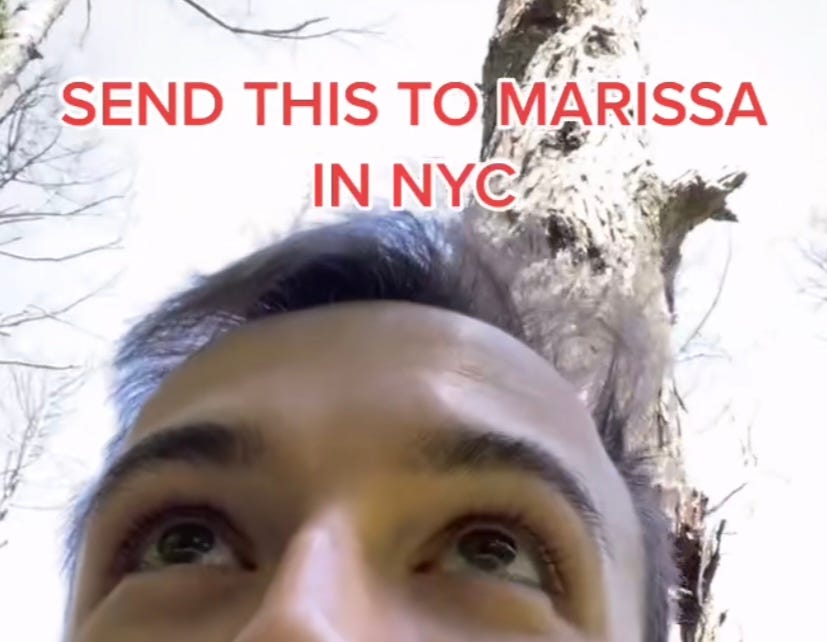The new TikTok surveillance state
"I'm tired of having to whisper my shit-talking because I live in fear that one of you people is going to post it."
Embedded is your essential guide to what’s good on the internet, from Kate Lindsay and Nick Catucci.🧩
Please only film me in public if I look hot. Thanks! —Kate

In a now-deleted TikTok video, comedian Dana Donnelly makes “help me” eyes at the camera while a woman sings on stage behind her at a restaurant. In the caption, she makes it clear she had not intended to eat at a place where the servers sing. Perhaps inevitably, Donnelly's singing server discovers the video and duets it, explaining that she's working two jobs to provide for her child, and grateful for the opportunity to perform at a restaurant after almost two years of theaters being shut down due to the coronavirus pandemic. Her duet gets over one million views, and commenters turn on Donnelly. The original video disappears.
This just happened—Donnelly pulled down her video sometime last night. The problem wasn’t necessarily her joke. If you truly went into a restaurant expecting, understandably, that at no point would your servers break out into song, and then they did, that’s going to take a second or two to adjust to. Donnelly’s offense was indulging in an activity that, in fairness, users on TikTok have completely normalized: turning unsuspecting strangers into content.
In a world where our smartphones are frequently rolling, you could conceivably cobble all the video into a sprawling Truman Show-esque surveillance map. And that’s essentially what TikTok does, especially in social media-rich places like Los Angeles and New York City. I once saw an ex of mine in the periphery of a random video on my For You Page, and I worry daily that my shit-talking over drinks will end up fueling one of those “if your name is X and you live in X, your friends were saying this about you” videos.
That may sound paranoid, but remember Marissa Meizz. Her friends were overheard scheming to purposefully throw a birthday party when someone named Marissa was out of town, and a stranger used TikTok to locate the Marissa in question. Meizz, happily, capitalized on the experience to launch a series of country-spanning meetups called No More Lonely Friends.
Less happily, that viral story inspired more and more people who were privy to gossip between strangers to then blast that gossip all over the app in hopes of it reaching its subject. It became such a problem that a faction of TikTok users recently rose up in defense of people’s freedom to shit-talk.
“I’m tired of there being no safe spaces,” user Claire Parker says in a video. “I’m tired of going to a restaurant and having to whisper my shit-talking because I live in fear that one of you people on TikTok is going to post it and tell my friends that her mutuals are talking about her. Listen, it’s good to talk shit about your friends, it’s how you blow off steam, it’s why women don’t go to war.”
Regardless of how you feel about shit-talk, humans shouldn't have to worry that their conversations could at any moment be beamed to millions of people. How can we be so freaked out when an Instagram ad shows us a pair of shoes we were just talking about, but then turn around and share another person’s private experience?
The more I think about it, the more overwhelming it gets: Ring doorbell videos of drunk neighbors and playful delivery workers getting millions of views, unverified Deux Moi celebrity stories leading to articles like this one, TikTokker Melissa Ong sharing her social security number because “what’s somebody going to do with it?” While I don’t feel like I personally have much at stake—really, what is somebody going to do with my social security number? My taxes? [Editor’s note: This is a joke. Don’t share your SSN]—clawing away our own privacy this way seems likely to generate an avalanche we’ll later say we should have seen coming. I see it! I see you! I see everything, all the time.




